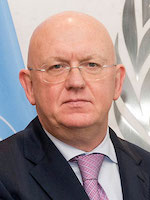 | Vassily A. Nebenzia is the Permanent Representative of the Russian Federation at the United Nations. He graduated from MGIMO University in 1983 and has held various diplomatic posts in the central office of the Ministry of Foreign Affairs of Russia and abroad, including Attaché at the Embassy of the USSR in Thailand (1988-1990); Third Secretary, Second Secretary at the Directorate of International Organizations (1990-1992); Division Head, Department of International Organizations (1993-1996); Senior Counsellor at the Permanent Mission to the UN (1996-2000); Section Head, Department of International Organizations (2000-2003); Deputy Director of the Department of International Organizations (2003-2006); Deputy Permanent Representative to the United Nations Office and Other International Organizations in Geneva (2006-2012); Director of the Department for Humanitarian Cooperation and Human Rights (2012-2013); and Deputy Minister of Foreign Affairs (2013-2017). Nebenzia holds the diplomatic rank of Ambassador Extraordinary and Plenipotentiary. He was awarded the Medal of the Order “For Merit to the Fatherland,” II class and the Order of Friendship. |
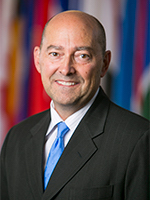 | James G. Stavridis is the Dean of The Fletcher School. He is a retired four-star officer in the U.S. Navy and served as the NATO Supreme Allied Commander (2009-2013), responsible for Afghanistan, Libya, the Balkans, Syria, piracy, and cyber security. Stavridis was also Commander of U.S. Southern Command (2006-2009), overseeing all military operations in Latin America. He was the longest serving Combatant Commander in recent U.S. history. Stavridis has also published eight books on leadership, the oceans, maritime affairs, and Latin America, as well as hundreds of articles in leading journals. He is a frequent commentator in the media and an established expert on security. Stavridis holds a B.S. from the U.S. Naval Academy and a MALD and Ph.D. from The Fletcher School. |
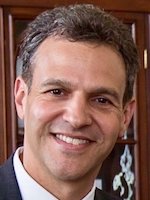 | Roland Paris is the University Research Chair in International Security and Governance at the University of Ottawa, where he teaches in the Graduate School of Public and International Affairs. He has expertise in the fields of international security and peacebuilding, global governance, and foreign policy. He has won several prizes and citations for his research, including the Grawemeyer Award for Ideas Improving World Order, and six awards for teaching and public service. Paris has also held several positions in government, most recently as Senior Advisor to the Prime Minister of Canada. He has also been the Director of Research at the Conference Board of Canada and served on a ten-member group of international experts advising the Secretary-General of NATO. Paris holds a Ph.D. from Yale University, an M.Phil. from the University of Cambridge, and a B.A. from the University of Toronto. |
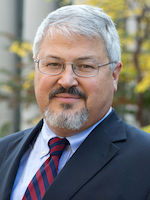 | Jack Goldsmith is the Henry L. Shattuck Professor at Harvard Law School, a Senior Fellow at the Hoover Institution, and a co-founder of Lawfare. He teaches and writes about national security law, presidential power, cybersecurity, international law, internet law, foreign relations law, and conflict of laws. Previously Goldsmith served as Assistant Attorney General, Office of Legal Counsel (2003-2004), and Special Counsel to the Department of Defense (2002-2003). He was a Professor at the University of Chicago Law School (1997-2002) and at the University of Virginia School of Law (1994-1997). Before entering the academy, Goldsmith was an associate at Covington & Burling in Washington, D.C. He earned a J.D. from Yale Law School (1989), a B.A. from Oxford University (1986), and a B.A. from Washington & Lee University (1984). |
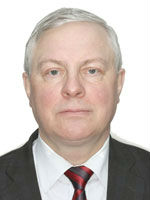 | Mikhail N. Lysenko is an Associate Professor of the Department of International Law at MGIMO University, He graduated from MGIMO University in 1977 with honors. His Ph.D. thesis in 2006 was on the Legal Problems and Prospects for Prohibiting Deployment of Weapons in Outer Space. His areas of expertise include international nuclear law, international outer space law, and arms control and disarmament issues. He has authored over 20 publications and has compiled three volumes of international treaties and other sources of international nuclear law. Previously he served in the Ministry of Foreign Affairs of Russia, including as Ambassador of the Russian Federation to New Zealand (2004-2008). He has also served as the Director of the International Cooperation Department at the Russian State Atomic Corporation “Rosatom” (2008-2015). |
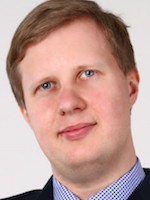 | Igor A. Istomin is a Senior Lecturer at the Department of Applied Analysis of International Issues at MGIMO University. He holds Ph.D. and M.A. degrees from MGIMO University as well as an undergraduate degree from Saint Petersburg State University. Istomin teaches undergraduate and graduate classes in methods of applied analysis of international affairs. He is an executive editor at International Trends, a leading Russian academic journal. He is also a visiting fellow at the School of International and Public Affairs at Jilin University in China. Istomin is the author of more than 50 publications on U.S. foreign policy, relations in the Euro-Atlantic space, and international security. His most recent book is The Logic of State Behavior in International Politics (2017). He has also prepared policy reports and papers for the Russian International Affairs Council, the Valdai Discussion Club, the Center for Strategic Research in Moscow, and the European Leadership Network. |
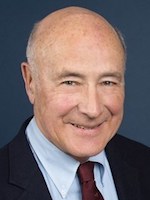 | Joseph Nye is a Distinguished Service Professor, Emeritus at Harvard University and a former Dean of the Harvard's John F. Kennedy School of Government. He received a bachelor's degree summa cum laude from Princeton University, won a Rhodes Scholarship to Oxford University, and earned a Ph.D. in Political Science from Harvard. He has served as Assistant Secretary of Defense for International Security Affairs, Chair of the National Intelligence Council, and Deputy Under Secretary of State for Security Assistance, Science and Technology. His most recent books include The Powers to Lead (2010), The Future of Power (2012), Presidential Leadership and the Creation of the American Era (2014), and Is the American Century Over? (2015). He is a fellow of the American Academy of Arts and Sciences, the British Academy, and the American Academy of Diplomacy. |
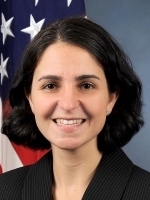 | Mara Karlin joined the Johns Hopkins School of Advanced International Studies (SAIS) as an Associate Professor of the Practice of Strategic Studies in 2017. She also serves as the Associate Director of the Strategic Studies Program at SAIS and the Executive Director of The Philip Merrill Center for Strategic Studies. Karlin has served in national security roles for five U.S. Secretaries of Defense, advising on policies spanning strategic planning, defense budgeting, future wars and the evolving security environment, and regional affairs involving the Middle East, Europe, and Asia. Previously Karlin served in a variety of policy positions in the U.S. Department of Defense. Her first book is Building Militaries in Fragile States: Challenges for the United States (2017). She received her B.A. summa cum laude in Political Science from Newcomb College, Tulane University and her M.A. with distinction in Strategic Studies, Middle East Studies, and Economics and Ph.D. in International Relations from SAIS. Karlin has been awarded Department of Defense Medals for Meritorious and Outstanding Public Service. |
 | Irina D. Zvyagelskaya is a Chief Research Fellow at the Institute of Oriental Studies at the Russian Academy of Sciences. She is a Professor in the Department of Oriental Studies at MGIMO University and at the Institute of African and Asian Studies at the Moscow State University. Zvyagelskaya’s areas of expertise include contemporary history, conflicts, international relations, and security issues in the Middle East and Central Asia. She has authored over 200 publications, including books, chapters and articles. |
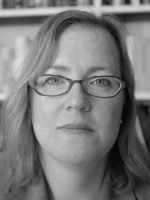 | Monica Toft is a Professor of International Politics and the Director of the Center for Strategic Studies at The Fletcher School. She is also a research associate at the Blavatnik School of Government at the University of Oxford and at the Harvard Kennedy School’s Belfer Center for Science and International Affairs. While at Harvard, she directed the Initiative on Religion in International Affairs and served as Assistant Director of the John M. Olin Institute for Strategic Studies. Toft’s areas of research include international security, ethnic and religious violence, civil wars, and demography. Her most recent books include Securing the Peace (2011), Political Demography (2012), and God’s Century (2012). Toft holds an M.A. and Ph.D. in Political Science from the University of Chicago. |
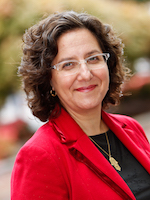 | Tamara Cofman Wittes is a Senior Fellow in the Center for Middle East Policy at the Brookings Institution. She served as Deputy Assistant Secretary of State for Near Eastern Affairs (2009-2012). She is a co-host of Rational Security, a weekly podcast on foreign policy and national security issues. She writes on U.S. Middle East policy, regional conflict and conflict resolution, the challenges of global democracy, and the future of Arab governance. Wittes is the author of Freedom’s Unsteady March: America’s Role in Building Arab Democracy (2008) and the editor of How Israelis and Palestinians Negotiate: A Cross-Cultural Analysis of the Oslo Peace Process (2005). She holds a bachelor's degree in Judaic and Near Eastern studies from Oberlin College, and master's and doctorate degrees in government from Georgetown University. |
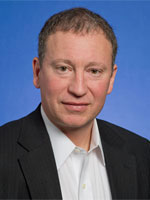 | Marc Lynch is a Professor of Political Science at the Elliott School of International Affairs at Georgetown University. He received his B.A. in Political Science from Duke University and his M.A. and Ph.D. in Government from Cornell University. He teaches courses on Middle Eastern politics and international relations. He is the Director of the Project on Middle East Political Science, a contributing editor for The Washington Post's Monkey Cage political science page, editor of the Columbia University Press series Columbia Studies on Middle East Politics, and a nonresident senior associate at the Carnegie Endowment for International Peace. |
 | Constanze Stelzenmüller is the inaugural Robert Bosch Senior Fellow in the Center on the United States and Europe at the Brookings Institution. Previously she was a Senior Transatlantic Fellow with the German Marshall Fund of the United States, where she directed the Transatlantic Trends survey program. Her areas of expertise include transatlantic relations, German foreign policy, NATO, EU foreign, security, and defense policy, international law, and human rights. Her essays and articles have appeared in a wide range of publications. She holds a doctorate degree in law from the University of Bonn (1992), a master’s degree in public administration from the Harvard Kennedy School (1988), and a law degree from the University of Bonn (1985). |
 | Kimberly Marten is the Ann Whitney Olin Professor of Political Science at Barnard College, and a faculty member of the Graduate School of Arts and Sciences and School of International and Public Affairs at Columbia University. She directs the Program on U.S.-Russia Relations at Columbia's Harriman Institute and is a member of Columbia's Saltzman Institute of War and Peace Studies, PONARS-Eurasia, and the Council on Foreign Relations, which published her Special Report, Reducing Tensions between Russia and NATO (2017). Her latest book, Warlords: Strong-Arm Brokers in Weak States (2012), traces the development and consequences of warlordism in the tribal areas of Pakistan, Sunni Arab areas of Iraq, and post-Soviet Georgia and the Republic of Chechnya in Russia. Marten earned her A.B. at Harvard University magna cum laude (1985) and Ph.D. at Stanford University (1991). |
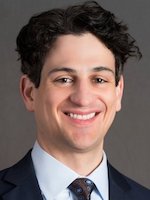 | Samuel Charap is a Senior Political Scientist at the RAND Corporation. His research interests include the political economy and foreign policies of Russia and the former Soviet states, European and Eurasian regional security, and U.S.-Russia deterrence, strategic stability, and arms control. Charap was the Senior Fellow for Russia and Eurasia at the International Institute for Strategic Studies (2012-2017). Previously he served at the U.S. Department of State as the Senior Advisor to the Undersecretary for Arms Control and International Security and on the Secretary's Policy Planning Staff, covering Russia and Eurasia. Charap was the Director for Russia and Eurasia at the Center for American Progress (2009-2011). Charap was a visiting scholar at the Carnegie Moscow Center and the International Center for Policy Studies in Kyiv, and a Fulbright Scholar at the Moscow State Institute of International Relations. He holds a Ph.D. in Political Science and an M.Phil. in Russian and East European studies from the University of Oxford, where he was a Marshall Scholar. He received his B.A. in Russian and Political Science from Amherst College. |
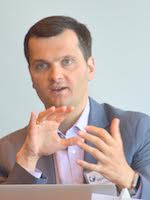 | Mikhail Troitsky is Associate Professor and Dean of the School of Government and International Affairs at MGIMO University, and IMARES Program Professor in European University at Saint Petersburg. From 2009 to 2015, he was Deputy Director at the Moscow office of the John D. and Catherine T. MacArthur Foundation. His areas of expertise and research interests include international relations and negotiation theory, Eurasian security, U.S. foreign policy and Russia’s relations with the United States, NATO and the European Union. Educated at Saint Petersburg State University and the Russian Academy of Sciences, Mikhail has 17 years of experience managing international research and training projects in the nonprofit sector. His co-edited volume titled Tug of War: Negotiating Security in Eurasia was published in 2017. |
 | Katharine H.S. Moon is Professor of Political Science and the Wasserman Chair of Asian Studies at Wellesley College, where she has taught since 1993. She was the inaugural holder of the SK-Korea Foundation Chair in Korea Studies (2014-2016) at the Brookings Institution and is a nonresident senior fellow. She received a B.A., magna cum laude, from Smith College and a Ph.D. in politics from Princeton University. Moon is the author of Protesting America: Democracy and the U.S.-Korea Alliance (2013), an analysis of the impact of South Korea’s democracy on the U.S.-Korea alliance. Moon’s current book project, “Migrants, Defectors, and the Future of Democracy on the Korean Peninsula,” addresses the impact of migration and demographic change in South Korea on its young democracy and its changing foreign policy options. |
 | Dmitry V. Streltsov is the Chair of the Department of Oriental Studies at MGIMO University and the leading research fellow of the Center of Japanese Studies of the Institute of Oriental Studies at the Russian Academy of Sciences. Since 2008, he heads the Russian Association of Japanologists. He is the Chief Editor of Yearbook Japan and e-journal Japanese Studies in Russia. He has authored 200 academic works, including five monographic books. His research interests include the domestic and international politics of contemporary Japan, post-war history of Japan, energy and social policy of Japan, Russo-Japanese relations, economic integration in East Asia, and Russian diplomatic and security strategy in the Asia-Pacific region. |
 | Evan A. Feigenbaum is the Vice Chairman of the Paulson Institute at the University of Chicago. He is also a nonresident senior fellow in the Asia Program at the Carnegie Endowment for International Peace. Initially an academic, with a Ph.D. in Chinese politics from Stanford University, his work has since spanned government service, think tanks, and the private sector. He served at the U.S. State Department as Deputy Assistant Secretary of State for South Asia, Deputy Assistant Secretary of State for Central Asia, Member of the Policy Planning Staff with principal responsibility for East Asia and the Pacific, and as an adviser on China to Deputy Secretary of State Robert B. Zoellick. Feigenbaum has also been Head of the Asia practice group at the political risk firm Eurasia Group, Senior Fellow for Asia at the Council on Foreign Relations, Lecturer on Government at Harvard University, Lecturer of National Security Affairs at the U.S. Naval Postgraduate School, and Executive Director of the Asia-Pacific Security Initiative at the Harvard’s John F. Kennedy School of Government. He has authored three books and monographs, including most recently The United States in the New Asia (2009), and China’s Techno-Warriors: National Security and Strategic Competition from the Nuclear to the Information Age (2003). |
 | Sulmaan Khan is an Assistant Professor of International History and Chinese Foreign Relations at The Fletcher School. He also directs the Water and Oceans program at the Center for International Environment and Resource Policy. He received a Ph.D. in History from Yale University in 2012. He is the author of Muslim, Trader, Nomad, Spy: China’s Cold War and the Tibetan Borderlands (2015). He has published articles on Cold War and diplomatic history, and his research has been supported by the Cold War International History Project at the Woodrow Wilson International Center for Scholars. He has also written for The Economist, The American Interest, and Prospect on topics ranging from Burmese Muslims in China to dolphin migration through the Bosphorus. |
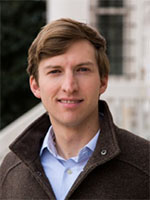 | Chris Miller is an Assistant Professor of International History at The Fletcher School. He has previously served as the Associate Director of the Brady-Johnson Program in Grand Strategy at Yale, a lecturer at the New Economic School in Moscow, a visiting researcher at the Carnegie Moscow Center, a research associate at the Brookings Institution, and as a fellow at the German Marshall Fund's Transatlantic Academy. His first book, The Struggle to Save the Soviet Economy: Mikhail Gorbachev and the Collapse of the USSR, was published in 2016. His second book, Putinomics: Power and Money in Resurgent Russia, will be published in 2018. He received his Ph.D. and M.A. from Yale University and his B.A. in history from Harvard University. |
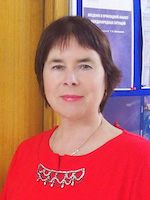 | Tatiana Shakleina is the Chair of the Department of Applied Analysis of International Issues at MGIMO University. She also serves as a Leading Research Associate at the Institute of the USA and Canada Studies at the Russian Academy of Sciences, where she earned her Ph.D. in World History and International Relations in 1984 and became a Professor of Political Science in 2003. She is the author or editor of over 200 publications on contemporary international relations, American and Russian foreign policy, Russian-American relations, American think tanks, Russian studies in the United States, and American studies in Russia, including Russia and the United States in World Politics (2012), Foreign Policy of the Bush Administration: Concepts and Practice (2003), and Russia and the United States in the New World Order (2002). |
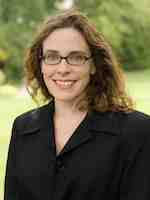 | Mary Elise Sarotte is the Dean’s Professor of History and Professor of International Relations at the University of Southern California (USC). In academic year 2017-2018, she is also visiting faculty at the Center for European Studies at Harvard University. Sarotte earned her A.B. in History and Science at Harvard University and her Ph.D. in History at Yale University. She is the author or editor of five books, including The Collapse: The Accidental Opening of the Berlin Wall (2014) and 1989: The Struggle to Create Post-Cold War Europe (2009), both of which were selected as Financial Times Books of the Year. After graduate school, Sarotte served as a White House Fellow and subsequently joined the faculty of the University of Cambridge. She received tenure there in 2004 before returning to the United States to teach at USC. Sarotte is a former Humboldt Scholar, a former member of the Institute for Advanced Study in Princeton, and a member of the Council on Foreign Relations. |
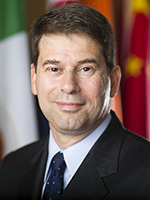 | Daniel W. Drezner is a Professor of International Politics, a nonresident senior fellow at the Brookings Institution, and a contributing editor at The Washington Post. Previously he taught at the University of Chicago and at the University of Colorado at Boulder. He has held positions with Civic Education Project, the RAND Corporation, and the U.S. Department of the Treasury, and received fellowships from the German Marshall Fund of the United States, Council on Foreign Relations, and Harvard University. Drezner has written six books, including The Ideas Industry (2017) and The System Worked (2014). He has published articles in numerous scholarly journals as well as in The New York Times, Wall Street Journal, Politico, and Foreign Affairs, and has been a contributing editor for Foreign Policy and The National Interest. He received his B.A. in Political Economy from Williams College and his M.A. in Economics and Ph.D. in Political Science from Stanford University. |
 | Andrey Baykov is the Vice President for Graduate and International Programs and Associate Professor of International Affairs at MGIMO University. He is also the editor-in-chief of Russia’s premier International Trends peer reviewed and Scopus Indexed journal, a member of the International Studies Association, a member of the Executive Board of the Russian Political Science Association, and the Director of the Academic Educational Forum on International Relations. In 2017, he was elected to the Youth Council on Education and Science Policy of the President of the Russian Federation, which brings together some 30 bright scholars across all disciplines from the whole of Russia in the age range of up to 35 years old. Baykov earned his master’s degree in International Relations in 2007 and his Ph.D. in Political Science in 2009 at MGIMO University. For his research of comparative regional integration in East Asia and Europe, he was awarded the First Prize of the Russian Academy of Sciences in 2013. He was the recipient of the Donald Robertson Award of the U.S. International Studies Association in 2013 for his paper on Eurasian integration. |
 | Naazneen H. Barma is an Associate Professor of National Security Affairs at the Naval Postgraduate School in Monterey, California. Her research and teaching focus on the comparative and international political economy of development, post-conflict peacebuilding and political order, and natural resource governance, with a regional specialization in East Asia and the Pacific. Barma’s most recent book is The Peacebuilding Puzzle: Political Order in Post-Conflict States (2017). She received her Ph.D. in Political Science from the University of California, Berkeley (2007). She has over fifteen years of full-time and consulting experience with the World Bank and other aid agencies. She is a founding member and co-director of Bridging the Gap, an initiative devoted to enhancing the policy impact of contemporary international affairs scholarship. |
 | Paul Arthur Berkman is building connections between science, diplomacy and information technology to promote cooperation and prevent discord, balancing national interests and common interests for the benefit of all on Earth. He was a visiting professor at the University of California at the age of 24, after wintering the previous year in Antarctica on a SCUBA research expedition. He was a Fulbright Distinguished Scholar and former Head of the Arctic Ocean Geopolitics Programme at the University of Cambridge, where he co-directed the first formal dialogue between NATO and Russia regarding environmental security in the Arctic Ocean. He also coordinates the Arctic Options and Pan-Arctic Options projects, involving support from national science agencies in the United States, Russian Federation, Norway, France, China and Canada (2013-2020). In 2015, he joined The Fletcher School as Professor of Practice in Science Diplomacy and is now Director of the Science Diplomacy Center. He has an extensive record of interdisciplinary research and publication, including books on Environmental Security in the Arctic Ocean (2012) and Science Diplomacy: Antarctica, Science and the Governance of International Spaces (2011). |